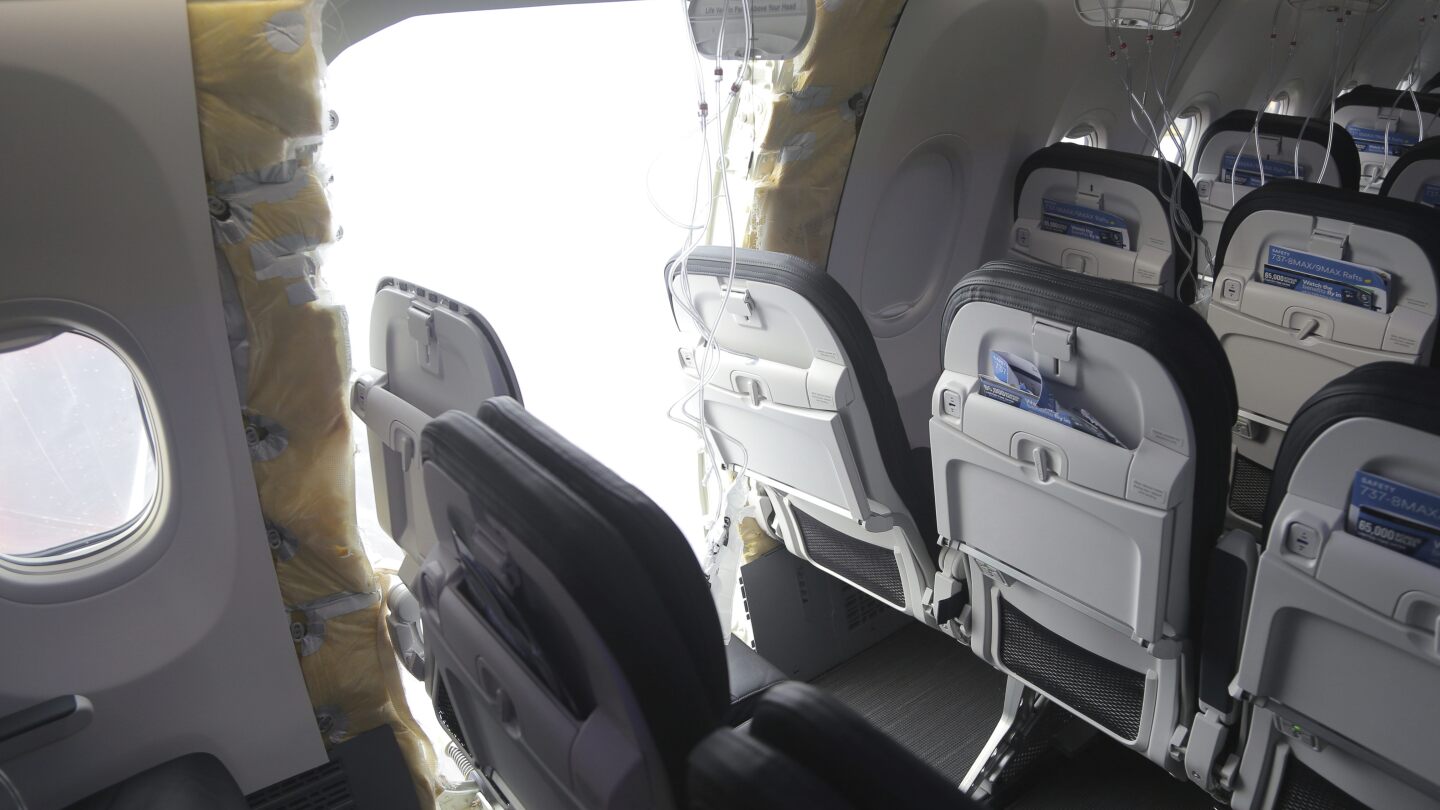The US is investigating if Boeing ensured a part that blew off a jet was made to design standards::The Federal Aviation Administration said that the investigation is focusing on plugs on Boeing 737 Max 9 jetliners.
In basic training our barracks would get “white glove” inspections, where the drill instructor would wear a literal white glove and run his finger over surfaces to detect anything that wasn’t clean, dry, and serviceable. And I’m not talking about just the obvious places, but also things like under the benches in the showers, or up and in a wall locker ledge.
The ultimate goal wasn’t to hand out demerits, it was to instill a sense of attention to detail in us. They asked us how could we be trusted to maintain nukes for example, when we failed to even find that stray clump of soap scum and pubes in the shower.
So that’s all to say: If the boeing apparatus is so fucked that doors are falling off their aircraft mid-flight, what the fuck else have they missed?
what the fuck else have they missed?

If it’s Boeing, I’m not going.
Even with the recent 737 max issues, it still remains safer to fly a Boeing than to drive wherever it is you’re going. Unless you live in Japan, China, or certain parts of Europe and Asia with safe high speed rail, you’re better off going with Boeing than almost anything else.
Yeah, but you can generally survive a car crash nowadays. Not on a Boeing plane deciding to commit sudoku and LARP as a IJN dive bomber.
Commit sudoku
Lol
Statistics can prove anything. 99% percent of everyone knows that. Be that as it may, I will walk before traveling on Starliner.
Of course it worked to design standards. The problem is just that the design requirements were “costs the least money” instead of “acts as a functional and safe airplane part.”
Yeah, that’s not very typical, I’d like to make that point
I would also like to note that the safety card blew out too. It’s a miracle they survived without the safety card
Well, some of them are built so that the plug door doesn’t fall off at all.
"One of the employees at Spirit AeroSystems, which reportedly manufactured the door plug that blew out of an Alaska Airlines flight over Portland, Oregon, allegedly told company officials about an “excessive amount of defects,” according to the federal complaint and corresponding internal corporate documents reviewed by us.
According to the court documents, the employee told a colleague that “he believed it was just a matter of time until a major defect escaped to a customer."
https://jacobin.com/2024/01/alaska-airlines-boeing-parts-malfunction-workers-spirit-aerosystems
The one the door fell off of? That’s not very typical; I’d like to make that point. There are a lot of these planes going around the world all the time and very seldom does anything like this ever happen. I just don’t want people thinking these planes aren’t safe.
Well, if this wasn’t safe, why did it have 80+ passengers on it?
deleted by creator
This is the best summary I could come up with:
The Federal Aviation Administration is investigating whether Boeing failed to make sure a panel that blew off a jetliner in midflight last week was safe and manufactured to meet the design that regulators approved.
The FAA asked Boeing to respond within 10 business days and tell the agency “the root cause” of the problem with the door plug and steps the company is taking to prevent a recurrence.
Earlier this week, Boeing CEO David Calhoun called the incident “a quality escape.” He told employees that the company was “acknowledging our mistake … and that this event can never happen again.”
The day after the blowout, the FAA grounded Max 9 jets, including all 65 operated by Alaska and 79 used by United Airlines, until Boeing develops inspection guidelines and planes can be examined.
On Friday, a Seattle law firm filed a class-action lawsuit against Boeing, saying passengers on the Alaska flight suffered physical and psychological injury and emotional distress.
“Recent accidents and incidents — including the expelled door plug on Alaska Airlines flight 1282 — call into question Boeing’s quality control,” Cantwell said in a letter to FAA Administrator Mike Whitaker.
The original article contains 808 words, the summary contains 191 words. Saved 76%. I’m a bot and I’m open source!
Can’t wait to see the air crash investigations episode on this
When 60 minutes returns, we’ll talk to engineer Graham Register who had only one job that year…to figure out how to set up the rapid depressurization system RDS and the RDS button documentation…
If this was a permanent plug, wouldn’t it make sense to have a overlap (flange?) On the inside so it physically wouldn’t fit out of the door? They know the pressurisation force is always (hopefully!) Going to be outward.
Spoiler alert: No!
No one died right? Right? I’m scared looking at the seats position, looks like someone got sucked out
The place next to the door was unoccupied, the incident (fortunately) also happened while the fasten seatbelts lights were still on.
A couple of mobile phones got sucked out but no human.
Good to note that the mobile phones survived as well
Nope there was a kid sitting there who lost his shirt or something. True luck or what?
Alaska airlines prices are so high they’ll take the shirt right off your back.
He sat in the middle seat and still lost his shirt.
Skeptical of how throughout this will be since Boeing and government regulatory bodies have quite a large crossover but glad it’s happening and hope it’s transparent enough to ease doubts.
Here is the more burning question: What is worse? Case “It was not made to design standards”: Then boing might have a problem in their manufacturing processes, which is going to have ramifications on the entire fleet. This would be bad, but fixable.
Case “It was made to design standards”: In that case you only have a problem with this one type of jet, but you have a problem in your fundamental design, which might ground the entire fleet (again).
Removed by mod
I understand your general point of cutting costs etc leading to failures but in this case your comment shows you aren’t aware of Soviet passenger aviation history
Removed by mod
Nah, the relevant question is, “Did Boeing force the Soviets to make shitty planes?” If not, you can’t claim capitalism is the source of crappy planes.
They had plenty worse of their own. Look up the TU-104 for example
Removed by mod
Obviously it’s a no to your question. Consider the point that the other person is making, though… Planes are bad sometimes regardless of whether they were built in capitalist or communist societies, so perhaps the root cause is not politics.









